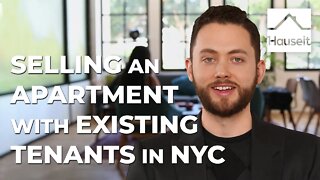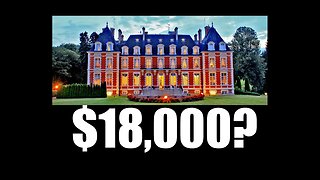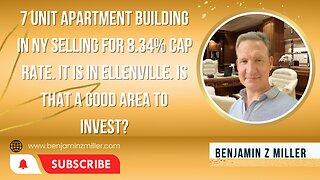Should You Buy an Apartment in a Smaller Boutique Building?
Save 2% When Buying in NYC: https://www.hauseit.com/hauseit-buyer-closing-credit-nyc/
NYC Buyer Closing Cost Calculator: https://www.hauseit.com/closing-cost-calculator-for-buyer-nyc/
Should you buy an apartment in a smaller boutique building? We'll demystify this topic on the following video. My name is Chris at Hauseit.
Generally speaking, no. We believe the cons outweigh the pros when it comes to smaller boutique buildings. Not only will you have fewer neighbors to share expenses, liabilities, and any unexpected surprises with but the impact of any crazy neighbors is supersized as a much more likely beyond the board. Furthermore, a smaller building typically means fewer competent candidates with the free time, desire, or capability to volunteer for the board.
On the other hand, apartments at boutique buildings are more rare and the privacy and the exclusivity that comes from living in a smaller building tends to help those valuations. As a result, if you want to avoid the mega towers and live in a more intimate setting, we highly recommend an apartment in a smaller building but with one caveat, don't buy the building that's too small. We think the sweet spot is a building that has more than 10 units but less than 30 or so units.
Larger share of any building expenses or liabilities. One of the biggest risks to buying an apartment in a smaller boutique building is the fact that you'll be responsible for a greater proportion of any building-wide expenses or liabilities. Whereas, in a larger apartment building with let's say 100 or 200 plus units, you typically won’t have to worry about being say unable to afford a hefty surprise condo or co-op special assessment. Well, that's due to the sheer number of neighbors you'd get to split any bills with. In a smaller building however, you might only have say 10 or under 10 or under 20 units total with whom to split costs with. That can be quite scary for a large assessment.
Boutique buildings are typically defined as condo, co-op, condop, or rental apartment buildings with 20 or fewer apartment units. Now, everything is expensive in New York so if you're buying an apartment in a smaller building in NYC you need to understand that everything from labor to parts to materials can be prohibitively expensive in New York. Contractors typically blindly assume that you're filthy rich just because you own an apartment in Manhattan or Brooklyn and they won't hesitate to give you arbitrary quotes seemingly out of thin air simply because there's a chance that a wealthy New Yorker won't blink and won't bother bargaining at all. It does happen.
City violations can be expensive to remedy. When it comes to money New York City's government agencies can cause them serious damage to property owners. For example, a boutique condo with 10 units that fails a Local Law 11 inspection and has your building rated unsafe will face enormous amount of headache and monetary loss. Not only will the building have to pay thousands per month to rent a scaffolding immediately to prevent any injuries to pedestrians from falling bricks, masonry, and other materials in the building but the building will have to spend hundreds of thousands or perhaps even millions to repair the facade.
If the building happens to be landmarked, prepare for an even bigger bill and an even longer time to complete any facade repairs. The LPC is known for requiring bureaucratic approval for any minute changes to the exterior of a landmarked building. How fun do you think this will be for you if you only have 9 other neighbors to share the cost of this massive bill and this debacle with?
Fewer people to volunteer for the board. Fewer neighbors mean fewer competent, willing, and honest people who might be open to serving on the condo or co-op board. This can actually be a serious issue specially in luxury boutique condominiums where all the owners are presumably very busy with their jobs or otherwise preoccupied. As you can imagine it can be very hard to find an owner who's willing to devote serious time and attention to the job of being a board member. The worst-case scenario is a board composed of unwilling board members who don't pay any attention to what's going on in the building at all.
In this situation you may have a managing agent that is essentially has total control of what happens in the building and an unresponsive board that essentially rubber stamps anything that the managing agent suggests. This is an extremely dangerous situation to be in as it can lead to costs spiraling out of control. Remember, that the managing agent isn't paid more if the building saves money.
Save 2% When Buying in NYC: https://www.hauseit.com/hauseit-buyer-closing-credit-nyc/
NYC Buyer Closing Cost Calculator: https://www.hauseit.com/closing-cost-calculator-for-buyer-nyc/
.
.
Hauseit LLC, Licensed Real Estate Broker
Tel: (888) 494-8258 | https://www.hauseit.com
_
#hauseit #hauseitny
-
 5:13
5:13
hauseit
4 years agoSelling an Apartment with Existing Tenants in NYC
94 -
 7:24
7:24
hauseit
4 years agoWill You Regret Buying an Apartment in NYC?
23 -
 8:56
8:56
Franchise City Rumble
4 years agoWe Buy Ugly Houses is a...... Franchise?
95 -
 4:32
4:32
bulletproofcashflow
3 years agoIdeas to Avoid Overspending When Renovating Your Multifamily Deals
59 -
 10:21
10:21
Franchise City Rumble
4 years ago $0.02 earned5 Real Estate Investing Ideas Low Risk/ Low Budget
61 -
 5:01
5:01
benjaminzmiller
1 year ago7 unit apartment building in NY selling 8.34% cap rate in Ellenville. Is it a good area to invest?
7 -
 7:47
7:47
Franchise City Rumble
5 years agoAirBnB Franchise? Property Management Opportunity
3 -
 7:03
7:03
Franchise City Rumble
3 years agoBuy a Franchise for Sale.... or Start a New Business? It Depends.
28 -
 27:01
27:01
Autorestomod and Manic Mechanic
2 years ago $0.06 earnedBefore You Build A Shop
279 -
 44:06
44:06
TheFreedomChasersPodcast
1 year agoThe Truth About Buying Your First Real Estate Investment. AirBNB and Short Term Rental Strategies
20